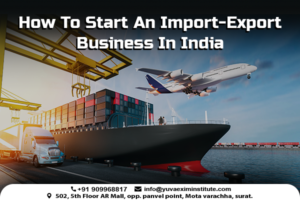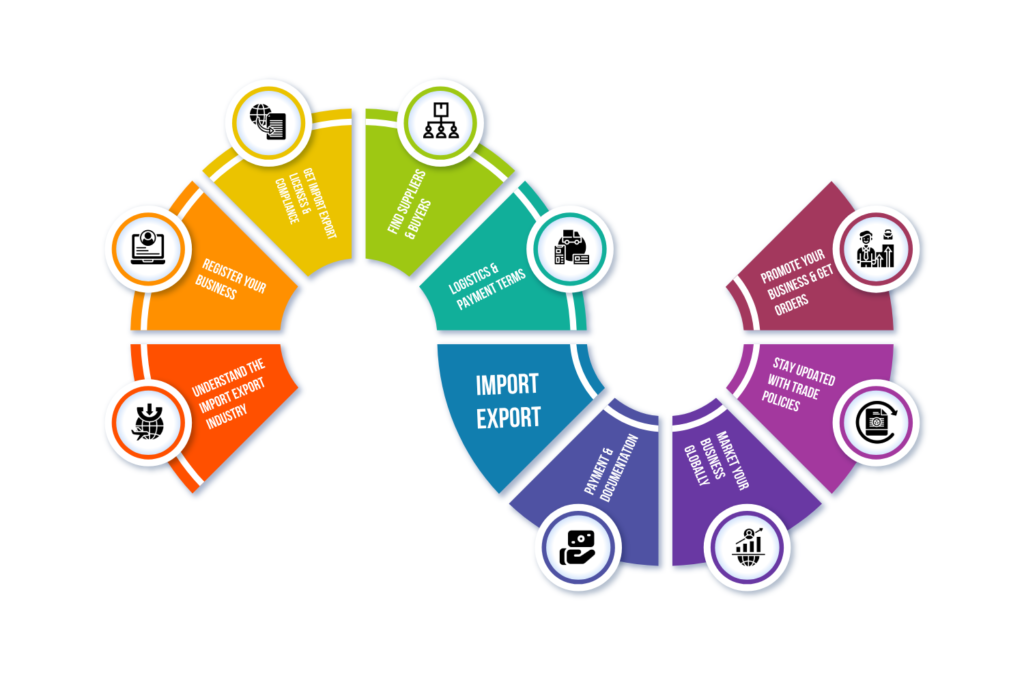
Want to start an import-export business in India but where to begin? Whether to import high-demand global products or export Indian goods worldwide, this step-by-step guide will help you set up, register, and grow your international trade business!
Whether you want to import high-demand global products or export Indian goods to international markets, setting up an import-export business requires proper planning, registration, and strategy. In this guide, we’ll walk you through the step-by-step process of starting your own import-export business in India.
Your roadmap to success in Global Trade:

1. Understand The Import Export Industry:
- Before stepping into the business, it’s crucial to research the global trade market. Identify the most profitable products, analyze demand, and understand international trade policies.
- Popular export items from India include textiles, spices, pharmaceuticals, and handicrafts, while commonly imported products include electronics, machinery, and chemicals.
2. Register Your Business:
If you want to do import export business in India, register your company. You can see…
- Choose a Business Structure: Decide whether to register as a Sole Proprietorship, Partnership, LLP (Limited Liability Partnership), or Private Limited Company.
- Obtain a GST Registration: A Goods and Services Tax (GST) number is mandatory for tax compliance.
- Apply for an Import Export Code (IEC): This is a mandatory license issued by the Directorate General of Foreign Trade (DGFT), allowing you.
3. Get Import Export Licenses & Compliance:
Your import export license is required, you should first obtain and comply with it.
- RBI-Approved Current Account: Open a bank account with an Authorized Dealer (AD) bank for foreign transactions.
- Register with Export Promotion Councils (EPCs): Join EPCs relevant to your product category for benefits like incentives and trade fairs.
- Follow Customs Regulations: Ensure that all goods comply with Indian customs laws, including obtaining BIS (Bureau of Indian Standards) certification or FDA (Food and Drug Administration) approval where required.
4. Find Suppliers & Buyers:
Finding reliable suppliers and buyers is crucial for the success of your import export business.
~ For Imports:
Connect with global suppliers via B2B platforms like Alibaba, TradeIndia, or Global Sources.
- Manufacturer Directories: Use ThomasNet, Kompass, and Export Genius to find verified suppliers.
- Trade Fairs & Expos: Attend international trade fairs such as the Canton Fair (China) or SIAL (Food Industry Expo) to build direct connections.
~ For Exports:
Identify international buyers through trade fairs, embassies, and online marketplaces like Amazon Global or eBay.
- Export Promotion Councils (EPCs): Register with organizations like APEDA, EEPC, and FIEO to access buyer databases and trade fairs.
- B2B Platforms: List your products on Amazon Global, eBay, ExportHub, and Go4WorldBusiness to attract international buyers.
- Cold Outreach & Digital Marketing: LinkedIn, email campaigns, and Social Media Advertising (SMA).
5. Logistics & Payment Terms:
Determine logistics and payment terms.
- Choose the Right Shipping Mode: Depending on your product, opt for sea freight, air cargo, or courier services.
- Understand INCOTERMS: These define the responsibilities of buyers and sellers in international trade.
- Secure Payments: Use safe transaction methods such as Letters of Credit (LC), wire transfers, or PayPal for global transactions.
6. Payment & Documentation:
- Use a Letter of Credit or Advance Payment to avoid fraud.
- Maintain import/export documentation:
- Bill of Lading
- Commercial Invoice
- Packing List
- Shipping Bill
- Certificate of Origin
7. Market Your Business Globally:
Attract buyers and sellers to market your business globally and focus on digital marketing strategies like…
- Website & SEO: Optimize your business website with relevant keywords like “How to Start an Import-Export Business in India” for better search rankings.
- Social Media & B2B Platforms: Promote your products on LinkedIn, Facebook, and the industry
- Paid Advertising: Run Google Ads and social media campaigns to generate leads.
8. Stay Updated with Trade Policies:
International trade laws change frequently, affecting business operations.
- Keep track of Free Trade Agreements (FTAs), export incentives, and government schemes like MEIS (Merchandise Exports from India Scheme) and RODTEP (Remission of Duties and Taxes on Exported Products).
9. Promote Your Business & Get Orders:
- Build a professional website showcasing your products.
- Leverage social media marketing and Google Ads.
- Register on B2B marketplaces for global visibility.
- Promote your business and get orders from customers. Utilize digital marketing strategies such as SEO (Search Engine Optimization), SMA (Social Media Advertising), and Google Ads.
- Register on B2B marketplaces like Alibaba, IndiaMART, and TradeIndia to connect with importers and exporters worldwide
Final Thoughts:
Starting an import export business in India requires proper registration, compliance, and strategic planning.
With the right knowledge and a strong network, you can successfully expand your trade operations and tap into global markets.
If you want expert guidance, Yuva Training Institute of Import Export offers professional courses to help you master the fundamentals of international trade.
Contact us today to start your import-export journey!
~ these steps, you can launch and grow your import-export business in India. Let me know if you need further details!
Yuva import export training:
Learn during our Exim training:
- All topics live online training + offline training
- Free repeat training
- Port/ICD/Air cargo visit as per approval
- Special training on how to find Buyers
- Free lifetime helpdesk support
- 100% job Assistance
- Free guidance on opening an office abroad
- Free Assistance for website and Digital Marketing
- Free latest updates on import export
- Free copy of all documents and materials
- Free exporters and importers (Buyers) Data
- Practical training certificate of import export
- We have many more success stories of importers and exporters.
Encouraging Action:
Ready to Start Your Import-Export Journey? Don’t wait! Take the first step today and turn your global trade dreams into reality. Join our online/offline import-export training.
Wishing you the best!
🚀Join us at Yuva Training Institute and unlock new career opportunities in the import-export industry!
📞 Call us now: +91 9099668817
✉️ Email: info@yuvaeximinstitute.com
What is an import-export business?
An import-export business involves buying goods from one country (importing) and selling them in another (exporting). It connects global markets and allows businesses to trade internationally.
Is an import-export business profitable?
Yes, it can be highly profitable if done correctly. Success depends on factors like choosing the right products, understanding market demand, following regulations, and building strong supplier and buyer relationships.
Do I need a license to start an import-export business?
Yes, most countries require specific licenses and registrations. In India, you need an Import Export Code (IEC) from the Directorate General of Foreign Trade (DGFT). Other permits may be required depending on the product.
What are the best products to export from India?
Popular export products include:
- Agricultural products (spices, rice, tea)
- Textiles and garments
- Handicrafts and home décor
- Pharmaceuticals
- Engineering goods
What are the risks involved in import-export business?
Some common risks include:
- Currency fluctuations
- Government regulations and trade restrictions
- Quality control issues
- Delayed payments from buyers
- Shipping and logistics challenges
How can I find international buyers for my export business?
You can find buyers through:
- Online B2B platforms (Alibaba, IndiaMART, Global Sources)
- Trade fairs and exhibitions
- Export promotion councils
- Social media and networking
- Cold emailing and direct outreach
What documents are required for import-export?
Key documents include:
- Bill of Lading/Airway Bill
- Commercial Invoice
- Packing List
- Certificate of Origin
- Letter of Credit (if applicable)
- Import Export Code (IEC)
How do I manage logistics for international trade?
You can manage logistics by working with freight forwarders, choosing reliable shipping companies, and understanding Incoterms (International Commercial Terms) to determine shipping responsibilities.
Can I start an import-export business from home?
Yes, you can start from home with minimal investment. Many entrepreneurs begin by trading in small quantities, using online platforms, and gradually expanding.
How can Yuva Training Institute help me start my import-export business?
At Yuva Training Institute, we provide:
✅ Practical training on international trade
✅ Expert guidance on documentation and compliance
✅ Government-recognized certification
✅ Business setup support and mentorship
✅ Real-world case studies to boost confidence
